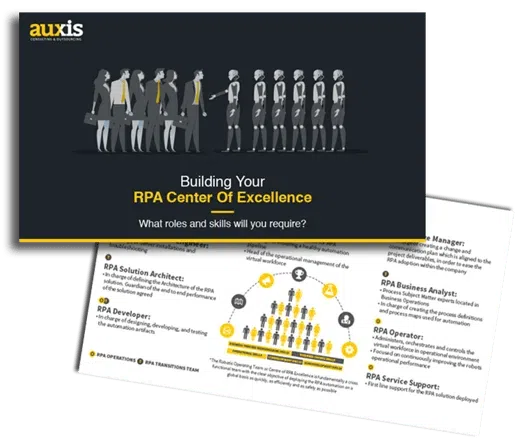Too many RPA journeys fall apart because organizations fail to recognize the critical need to establish a strong, multi-functional team from early on to successfully implement and scale their automation program. Automation requires multiple specialized skills to effectively design, monitor, and optimize usage – and without the right people to drive it forward, companies may give up because they never achieve the value they expected.
Roughly half of RPA projects fail – and 65% stall after 10 or fewer automations. With so many organizations struggling, how can executives ensure they realize the promise of automation?
Whether companies plan to build RPA capabilities in-house, hire a third-party provider, or opt for a hybrid solution, establishing a dedicated RPA Center of Excellence (CoE) is essential to preventing your automation program from derailing. With clearly defined roles and responsibilities, the CoE team is charged with evaluating, implementing, and maintaining automation throughout an enterprise.
In this article we will focus on examining the role of the Business Analyst – and why process improvement and automation should go hand-in-hand.
RPA process improvement: A key step in a successful automation journey
There’s a popular saying that could have been written for an RPA journey: “Insanity is doing the same thing over and over again and expecting different results.” Too many RPA teams are filled with technical experts who don’t understand business process design.
While IT plays a key governance role in automation, RPA is ultimately a business-driven solution. Applying automation to a business process “as-is” without fixing its underlying flaws is a main reason RPA projects fail. At the end of the day, all you’ve done is sink resources into making an inefficient process run faster.
CoEs that incorporate an experienced RPA Business Analyst start their automation journey on the right foot by identifying opportunities to clean up and improve the process as part of the newly designed RPA workflow.
Most manual processes involve unnecessary steps that an experienced Business Analyst could identify and eliminate. Similarly, a lack of skilled resources could cause organizations to omit critical steps in the RPA design, leaving automatable tasks to human judgment when consistent algorithms could have been applied to trigger better and more consistent decision-making.
Many companies underestimate the complexity of their business processes as well. They don’t realize how many process exceptions exist in daily operations that would cause robots to malfunction continuously if not considered as part of the process design.
“Too many RPA teams are filled with technical experts who don’t understand business process design.”
RPA can generate game-changing results as long as it is applied to processes that are clearly defined. But robots are trained to specific user interfaces and require reprogramming when something unexpected occurs, whereas that is an exception not previously considered, updates to an external application, or input formatting changing unpredictably.
Unresolved process exceptions represent one of the biggest RPA pitfalls, causing frustrated users to revert to manual methods and senior stakeholders to lose faith in the technology.
How Business Analysts ensure process improvement and automation go hand-in-hand
Workers wading through the weeds of daily operations rarely realize when business process improvements can drive better outcomes. Gartner reports that 46% of CIOs rank culture change as the biggest barrier to digital transformation efforts. Some organizations also resist RPA process improvements because asking robots to follow their existing steps reassures them the task will be completed correctly, especially during Proof of Concept.
RPA Business Analysts rely on extensive business operations and process knowledge to demonstrate why redesigning a process will help an enterprise better achieve its goals. They are experts at identifying the parts of a business that can benefit most from RPA, creating the process definitions and maps used to ensure accurate, productive, and scalable automations.

Business Analysts are trained to uncover inefficiencies that RPA easily corrects like “swivel chair integrations,” or processes that force employees to needlessly re-key data between systems. They are also typically tasked with documenting legacy knowledge and experience associated with transactions selected for automation. An exceptional Analyst can even help create process designs that optimize ROI for businesses anticipating process changes down the road.
Every business process won’t require an extensive redesign to reap the benefits of RPA. But typically, process improvement and automation go hand-in-hand – requiring an RPA dream team that combines technical knowledge with a business-honed ability to spot inefficiencies, streamline workflows, minimize process exceptions, and reduce data silos and bottlenecks. RPA process improvements can significantly increase a project’s ROI by enabling bots to operate at optimal speed and efficiency.
Otherwise, an enterprise may achieve basic labor arbitrage savings from automation but is likely to miss out on opportunities to dramatically improve process outcomes, quality, and cycle times. It can wind up with overly complex automation scripts that need to be revisited down the road.
And more often than not, its RPA journey will miss the forest for the trees because technically-minded implementers failed to consider how a process connects with the company’s greater strategic goals.
4 key skillsets to look for in your RPA Business Analysts
Having a strong business process design team that can ask the right questions, spot inefficiencies, and anticipate and prepare for most process exceptions is essential to RPA success. Let’s examine the skillsets of an outstanding Business Analyst:
- Expertise in lean business process improvement. Lean Business Process Improvements eliminate waste and increase process speed. Analysts trained in existing methodologies like Lean Six Sigma are experts at helping organizations optimize their processes before RPA implementation, while also providing a framework for culture change.
- Strong communication and problem-solving skills. Exceptional Business Analysts are master interviewers. They know how to ask the right questions to draw the information they need from the business and translate it into documentation that leads to successful automation. To do their job effectively, Business Analysts must also possess the ability to build bridges between departments or processes that have been siloed.
- Competencies in database analytics and database management. Analysts skilled in data analytics know how to evaluate and classify large data sets, interpret their importance to organizations, and make recommendations for changes that improve operations and outcomes. With data management expertise, Business Analysts understand how to manage and manipulate data needed to make informed decisions.
- Experience that encompasses business and consulting roles. Advising a business on process redesign offers a different perspective than living the experience as part of an organization. Business Analysts well-versed in both dynamics bring multifaceted expertise to the table that amplifies their ability to see all sides of an issue, anticipate an organization’s pain points, and optimize RPA process improvements.
Automate business processes with the right RPA partner to maximize results
When implemented properly, RPA has the potential to transform the way a business works. But the human team that leads your automation journey will make or break its success – and unfortunately, the newness of RPA technology combined with the national IT labor shortage can make finding the right resources a challenge.
Deloitte reports that 63% of businesses hire a dedicated third-party partner to lead their RPA journey, recognizing the critical need for skills unavailable within their organization. Choosing an RPA partner that combines technical knowledge with business process improvement expertise will accelerate your automation journey and help you maximize the value of your RPA investments.
Stay tuned for our next RPA blog where we will examine the role of the Solutions Architect.
